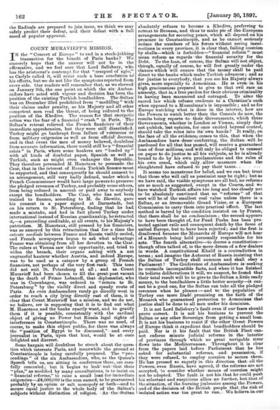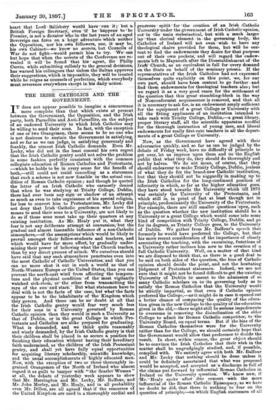COUNT MURAVIEFF'S MISSION.
IS the "Concert of Europe" to end in a stock-jobbing transaction for the benefit of Paris banks ? We sincerely hope that the answer will not be in the affirmative, and we feel sure that Lord Salisbury, who has the aristocrat's contempt for that "cesspool of agio," as Carlyle called it, will resist such a base conclusion td his efforts, but we do not like the symptoms repbrted froth every side. Our readers will remember that, as we showed on January 9th, the one point on whith the sir Ambas- sadors have acted with vigour and decision has been the position of the existing Turkish bondholders. The Sultan was on December 23rd prohibited from " medellink " *Ale their claims under penalty, as his Majesty and all other competent men read the threat, of being reduced td the position of the Khedive. The reason for that energetic action was the fear of a financial " crash " in Paris. The Sultan's retreat relieved the French financiers of their immediate apprehension, but they were still' dissatisfied. Turkey might go bankrupt from failure of reeetirces Or from military exigencies as well as from official' decrees, and in that event the men of money believed, doubtless from accurate information, there would still be a'"'fieancial crisis" in Paris, where some bankers are "loaded up" with all kinds of doubtful paper, Spanish as well .as Turkish, such as might even endanger the Republic. They therefore persuaded M. Hanotaux to persuade the Czar, that in the interest of Russia Turkish finance.must be supported, and that consequently he should consent to an arrangement, still very badly defined, under which a French Commissioner would have large powers to preserve the pledged revenues of Turkey, and probably some others, from being reduoed in amount or paid away to anybody except the bondholders. The Czar, who has not been trained to finance, according to M. de Blowitz, gave his consent in a paper signed at Darmstadt, but on his return to St. Petersburg, finding that he had made a mistake, and had in fact placed Turkey under, international instead of Russian guardianship, he.retracted it,—a proceeding creditable, at all events, to his Majesty's patriotism. M. Hanotaux, still pressed by his financiers, was so annoyed by this retractation thee for a time the entente cordiale between France and Russia visibly, cooled, and French newspapers began to ask what advantage France was obtaining from all her devotion to the Czar. The rulers at Vienna saw their opportunity, and tried to widen the breach, their organs asking with a not ungraceful hauteur whether Austria, and indeed Europe, was to be used as a catspaw by a group. of French, financiers, not perhaps of the very first rank. This tone did not suit St. Petersburg at all ; and as Count Muravieff had been chosen to fill the great post vacant by the death of Prince Lobanoff, that diplomatist, who was in Copenhagen, was ordered to "return. to St. Petersburg" by the visibly direct and. speedy route of Paris. As even Ambassadors rarely go directly west in order to reach a city lying directly east of them, it is clear that Count Muravieff has a mission, and we do not, we believe, err in supposing that it is to find out 'what M. Hanotaux and the banks exactly want, and to gratify them if it is possible, consistently with the cardinal object of giving no Power but Russia legal rights of interference in Constantinople. There was no need, of course, to make this object public, for there was. always the "position of Egypt to be discussed," and every journalist in Paris, upon that hint, would be at once delighted and discreet.
Some bargain will doubtless be struck about the quest tion which interests Paris, and meanwhile the ground at Constantinople is being carefully prepared. The " pro. ceedings " of the six Ambassadors, who, as the Queen's Speech tells us, are sitting in conference there, are care- fully concealed ; but it begins to leak but" tbet their " plan," as modified by many consultations, is to insist on "financial reforms," to raise a small loan for immediate exigencies-8,4,000,000 is the sum named; to be 'guaranteed probably by an opium or salt monopoly or both—and to secure equal justice to the whole body of the. Sultan's subjects without distinction of religion. As , the .'Sultan absolutely refuses to become a Khedive, preferring-to retreat to Broussa, and thus to make pie of the European arrangements for securing peace, which all depend on his presence in Constantinople, and as he cannot seriously reduce the numbers of his forces without seeing insur- rections in every province, it is clear that, failing coercion by shells—which is forbidden—" financial reform" must mean reform as regards the financial security for the Debt. To the loan, of course, the Sultan will not object, thOugh, equally of course, he will fret greatly under the clauses which Will ensure that the money shall be paid direct to the banks which make Turkish advances ; and as for 'justice to everybody, that you see his Majesty always gives, more especially to Armenians. He is even, in his high graciousness prepared to give to that evil race -an amnesty, that is, a free pardon for their obvious criminality in having been massacred and outraged. To alter the sacred law which refuses credence to a Christian'aaeabh when opposed to a Mussulman's is impossible ; and as for Europe watching what is done in the interior, how are the Powers to watch better than the Consuls do now, the results being reports to their Governments, which these Governments, whether in London or Vienna, simply dare not publish, lest opinion, for once excited beyond control, should take the reina into its ownhands ? It really, on the face of all the evidence,: comes to this, that when the !Ambassadors have done' conferring, the Sultan will. be pardoned for all that has passed, will receive a guaranteed loan of four millions,' and will only be obliged to consent on paper to do justice to all his subjects, as he is already bound to do by his own proclamations and the rules of his own creed, which only. alldw massacre when the slaughtered have refused to pay their taxes....
It seems too monstrous for belief, and we can but trust that those who will call us pessimist may be right ; but as we have said, the visible symptoms are all bad, no reforms are so much as suggested, except in the Courts, and we have watched Turkish affairs too long and tod closely not to be absolutely convinced that no "reforms" of that sort will be of the' smallest real value unless there is a Sultan, or an irremovable Grand Vizier, or a European Commission to carry them into practical effect. The last method is barred by the condition insisted on, by France, that there shall be no condominium ; the second appears to have been thought of, for Filed Pasha has been pro- tected against exile and consequent death by the force of united Europe, but to have been rejected; and the first is disallowed because the Monarchs of Europe will not hear of a Monarch being held' personally responsible for his acts. The fourth alternative—to decree a constitution— though often talked of, is the mere dream of a few dealers in words. A constitutional Khalif is a contradiction in terms ; and imagine the Autocrat of Russia. insisting that the Sultan of Turkey shall summon and shall obey a Parliament!' The Conference of Ambassadors is' seeking to reconcile incompatible facts, and when it has finished its tedious deliberations it will, we suspect, be found that their total result will be to give to the Silltan a little ready money, to the bondholders a little better security—it can- not be a good one, for the Sultan can take all the pledged revenues when he pleases —and to the population of Turkey one more Ira& promising on the faith of 'the Monarch who guaranteed protection to Armenians that justice shall be done to all men under his dominion.
It is not Lord Salisbury's 'fault even if our fears should prove correct. It is not his business to preveht the Sultan or any other Sovereign from getting te small loan. It is not his business to resist if 'the other Great Powers of Europe think it expedient that bondholders should be paid. Nor is it his fault that 'the British Fleet can- not enforce minute judicial reforms in the interibr of provinces through which no great navigable river flows into the Mediterranean. Throughout it is clear from, the papers laid before Parliament that. he has asked for substantial reforms; and permission, if they were refused, to employ coercion to secure them. He has pressed so eagerly in this direction that, all the Powers, even Russia, have agreed, if the reforms are not accepted, to consider whether means of -coercion might not be adopted. The fault is not his that he could, push his reluctant and suspicious allies 'no further, but that of the situation, of the. burning jealousies among the Powers, and of the -decision of the 'British people that the risk of isolated action was too great to run. We believeih our heart that Lord Salisbury *odd have 'run it; but n British Foreign Secretary,, wren "if he'happen a to be Premier, is not a dictator who in the last "years of an aged Sovereign can force on a huge. adventure which neither the Opposition, nor his own followers, nor, it may be, his own Cabinet—we know no secrets, but Councils of War do not fight—would permit him to try. We. can but hope that when the secrets of the Conference are re- vealed it will be found that his ' agent, Sir Philip Currie, while submitting sullenly to the general decisions, has warned his colleagues that unless the Sultan approves their suggestions, which is impossible, they will be treated while he reigns as counsels of perfection' which everybody must reverence everywhere except in his daily action.



















































 Previous page
Previous page